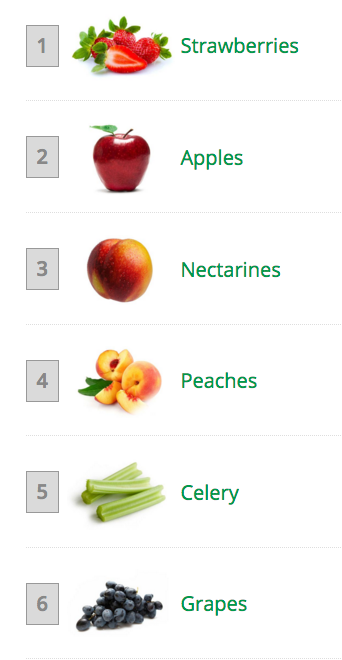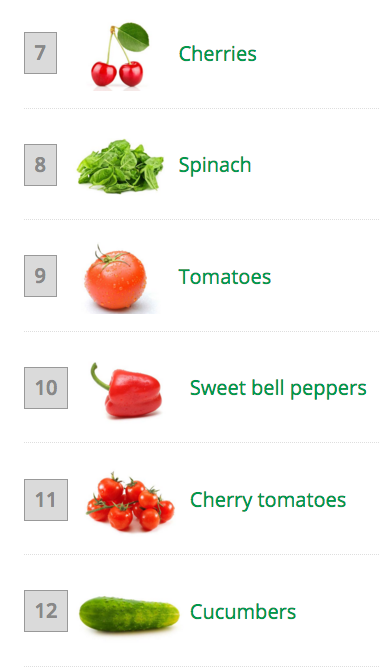12 Fruits and Veggies You Thought Were Healthy That Might Actually Bad for You

By:
Not all fruits and vegetables are created equally, and when it comes to retaining pesticides, new research shows that some might be way worse for your health.
The Dirty Dozen
A new list produced by The Environmental Working Group (EWG) highlights the top 12 fruits and vegetables that carry the most pesticides from the farm to your table, and it includes many popular items.
 Environmental Working Group - ewg.org
Environmental Working Group - ewg.org
 Environmental Working Group - ewg.org
Environmental Working Group - ewg.org
Strawberries top the list of the produce with the most pesticide residue on them. To identify this, researchers at EWG analyzed 35,200 samples of produce that were obtained from the U.S. Department of Agriculture and the Food and Drug Administration. They found 98 percent of strawberry samples tested positive for pesticide residue. Furthermore, nearly 50 percent had at least 10 types of pesticides on them. The EWG also found residual pesticides on 98-percent of Apples and Nectarines.
Why are there pesticides in our fruits and vegetables?
"Pesticides are the work horse of conventional agriculture. They're widely used throughout all stages of growing, but we're looking at the residues that remain on produce specifically after it's picked and processed and sold to people," Sonya Lunder, an EWG senior analyst, told ATTN:. Basically, this produce has already been washed and dried vigorously, but the residue remains.
Furthermore, pesticide use has gone up sharply for many plants. Not every fruit or vegetable is meant to be grown year-round in certain areas, so more pesticides are used to deal with more pests at certain times in the year. A report by the Center for Investigative Reporting found use of the toxic pesticide Chloropicrin increased 650 percent in California in the past two decades. There are concerns that elevated exposure to pesticides can do harm to the the colon and the nervous system, according to Nature.com.
Lunder said her main concern with these residues is they can pose risks to children and pregnant women who are especially susceptible to complications that arise when they're exposed to chemicals. Her main recommendation for consumers is to try to buy organic produce and always wash fruits and vegetables.
However, some experts say you shouldn't be too scared by the pesticide report.
In 2012, NPR reported that the fears of residual pesticides lurking in your produce might be overblown. For example, according to the NPR report, the Department of Agriculture's database shows that just one of the 744 apples tested by the EWG in 2012 exceeded the government's safe level for pesticides.
Further, a 2011 study published in the Journal of Toxicology and cited by NPR found that switching to organic produce wouldn't drastically reduce one's odds of consuming pesticides. "Our findings do not indicate that substituting organic forms of the 'Dirty Dozen' commodities for conventional forms will lead to any measurable consumer health benefit," the 2011 report found.
